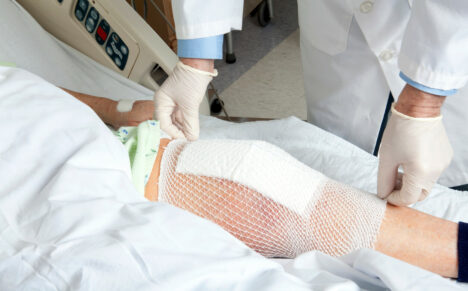Chronic knee pain is a common problem, especially among athletes and active adults. Most often, it is due to general wear-and-tear arthritis in the knee joint resulting from daily activities such as walking, standing, bending, and lifting, or the result of an injury sustained during athletic activity.
If your knee pain is constant or severe, and is combined with swelling and stiffness in your knee joint, it may be reducing your mobility to the point where it interferes with your work, social life, everyday tasks, and your general quality of life. If this is the case, your orthopedic doctor may recommend knee replacement surgery if other forms of pain-relief treatment (such as steroid injections or physical therapy) fail to improve your condition and x-rays show that you have bone-on-bone arthritis.
However, isn’t knee replacement surgery considered a major operation? The short answer is yes, a knee replacement has become very routine, but it is still major surgery. Let’s talk about why knee replacement may be necessary, how it is performed, how it can provide lasting pain relief and restored mobility, and where you can go in Raleigh and across the Triangle for outstanding orthopedic treatment.
When Is Knee Replacement Necessary?
Having a knee replacement becomes necessary when the knee joint is so worn or damaged from arthritis (particularly osteoarthritis) that it reduces your mobility and causes chronic knee pain, sometimes even when you aren’t putting any pressure on your knee.
Other conditions that can result in severe knee damage and warrant knee replacement surgery include:
- Bone-cell death due to blood supply problems
- Gout
- Hemophilia (reduced blood clotting)
- Knee injury or deformity
- Rheumatoid arthritis (RA)
What Knee Replacement Surgery Entails
Also referred to as a total knee arthroplasty, this surgery involves removing the damaged joint surfaces of your knee and replacing them with prosthetic, bio-grade materials. The surgery is most often performed using spinal anesthesia, which is better and safer than a general anesthesia, and helps with the initial recovery after surgery as well.
During the procedure, an incision is made in the knee area, and the damaged ends of the knee joint are removed and resurfaced with prosthetics. In a total knee replacement, the prosthesis comprises three components: the tibial component (which resurfaces the top of the shinbone, or tibia, in the lower leg); the femoral component (the bottom of the thighbone, or femur, in the upper leg); and the patellar component (the kneecap, or patella).
The incision is then closed with layers of stitches and surgical staples, a drain may be placed in the incision site to allow fluid to drain out and not cause swelling, and a sterile bandage or dressing is applied.
Immediately after the surgery, you will be taken to a recovery room where you will awake and remain briefly for observation. If your operation was outpatient surgery, you will be released to go home; if inpatient, you will be taken to a hospital room to stay overnight.
A physical therapist will then meet with you to show you how to move your new knee right after surgery, and to plan an exercise program. Any initial pain you may be experiencing will be controlled with prescription medication.
Benefits of Knee Replacement Surgery
Having a knee replacement can provide several welcome benefits:
- It effectively alleviates the debilitating pain you feel when walking, standing for extended periods, and even when sitting or lying down.
- It improves your mobility, allowing you to walk, climb stairs, and sit down or stand up with better range of motion in your knee.
- It reduces or eliminates your need for pain-relief medications.
- It offers a high success and satisfaction rate, improving your quality of life.
Knee Replacement Treatment in Raleigh, Apex, and Brier Creek, NC
Although knee replacement surgery is a major operation, a highly skilled surgeon can ensure a faster recovery with effective results. As a board-certified and fellowship-trained hip and knee replacement specialist, Dr. Brett Gilbert is uniquely qualified to accurately diagnose your joint pain, recommend the appropriate course of action, and safely perform the total or partial knee replacement surgery that is expected to provide the best possible outcome for you.
To request a consultation with Dr. Gilbert, call our practice today at (919) 788-8797 or you can request an appointment with Dr. Gilbert using our appointment request form, or you can self-schedule your appointment here. We look forward to being your orthopedic medical team!




